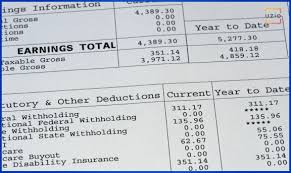Full-Time Employment : Pay Stub Fundamentals for Beginners
Introduction to Full-Time Employment Pay Stubs
When starting a full-time job, one of the most important documents you will receive is a pay stub. Full-time employment pay stubs provide detailed information about your earnings, deductions, and net income. These records are not just documents; they are essential for financial planning, tax preparation, and proof of income. This guide explains the fundamentals of pay stubs for full-time employees, why they matter, and how they connect with broader payroll and income verification processes.
Related topics: Remote Work Pay Stubs, Commission-Based Pay Stubs, Self-Employed Pay Stubs.
What Are Full-Time Employment Pay Stubs?
Full-time employment pay stubs are official payroll documents that outline your income and deductions for every pay period. They serve as proof that you are compensated according to your employment contract. A typical full-time pay stub includes:
- Gross wages before deductions
- Total hours worked, including overtime if applicable
- Federal, state, and local tax withholdings
- Social Security and Medicare contributions
- Health insurance or retirement plan deductions
- Net pay (take-home amount after deductions)
If you misplace a pay stub, you can recreate one using a regular pay stub format or generate an accurate version instantly through a pay stub generator.
Why Full-Time Employment Pay Stubs Are Important
Pay stubs are more than just payroll receipts. Full-time employment pay stubs are essential for:
- Proof of Income: Required when applying for loans, credit cards, or rental housing.
- Tax Filing: Ensures accurate reporting of wages, deductions, and withholdings.
- Employment Verification: Useful for background checks, immigration processes, and employment history verification.
- Financial Planning: Helps employees track earnings, budget effectively, and monitor deductions.
Organizing pay stubs prevents financial and legal complications. Missing documents can be supplemented with a pay stub generator to maintain accurate records.
Understanding Deductions on Pay Stubs
Full-time pay stubs contain several deductions, each affecting your net pay. Common deductions include:
- Federal Income Tax: Based on your W-4 selections and income bracket.
- State and Local Taxes: Applicable depending on your location.
- FICA Contributions: Social Security and Medicare deductions.
- Retirement Plans: 401(k) or pension contributions, if enrolled.
- Insurance Premiums: Health, dental, and vision coverage deductions.
Understanding these deductions is crucial for tax planning and ensuring accuracy in your paycheck.
How Employers Provide Full-Time Employment Pay Stubs
Most employers provide pay stubs digitally or in print. Delivery methods include:
- Printed stubs attached to physical paychecks
- Email delivery as PDF files
- Online payroll portals
If your employer does not issue pay stubs, request them formally or maintain your own records using a regular pay stub or a pay stub generator.
Using Pay Stubs for Tax Filing
During tax season, pay stubs provide essential information, including:
- Year-to-date income and tax withholdings
- Details for verifying your W-2
- Evidence of health insurance deductions
- Proof of retirement contributions
Keeping accurate copies prevents errors and ensures smooth filing. Digital or printed copies, or generating stubs via a pay stub generator, is highly recommended.
Challenges with Full-Time Employment Pay Stubs
Common challenges include:
- Lost or misplaced paper stubs
- Errors in tax withholding amounts
- Difficulty accessing payroll portals after leaving a job
- Incomplete information from employers
Maintaining personal copies and using a regular pay stub template mitigates these issues.
Best Practices for Managing Pay Stubs
- Save all copies, both digital and paper
- Check each pay stub for accuracy
- Organize by month or year
- Use a pay stub generator to fill missing records
- Keep a consistent filing system for employment history
Conclusion: The Value of Full-Time Employment Pay Stubs
Full-time employment pay stubs are more than payroll summaries—they are financial roadmaps. They help employees prove income, file taxes accurately, and manage deductions effectively. Maintaining accurate pay stubs ensures long-term financial stability. If lost, you can generate new ones using a pay stub generator or create a regular pay stub. Understanding and organizing pay stubs is key to financial security and peace of mind.

